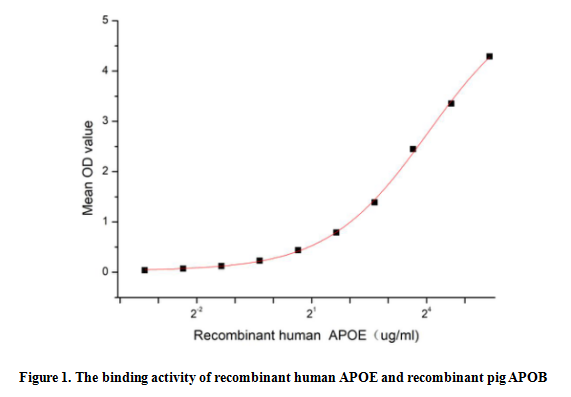Active Apolipoprotein E (APOE)
Apo-E; AD2; Apoprotein; Alzheimer Disease 2(E4-Associated,Late Onset
- Product No.UAPA704Hu61
- Organism SpeciesHomo sapiens (Human) Same name, Different species.
- Buffer FormulationPBS, pH7.4, containing 5% Trehalose.
- TraitsFreeze-dried powder
- Purity> 90%
- Isoelectric Point5.3
- ApplicationsCell culture; Activity Assays.
- Download Instruction Manual
- UOM 10µg50µg 200µg 1mg 5mg
-
FOB
US$ 126
For more details, please contact local distributors!US$ 315
For more details, please contact local distributors! US$ 630
For more details, please contact local distributors! US$ 1890
For more details, please contact local distributors! US$ 4725
For more details, please contact local distributors!
ACTIVITY TEST of the Active Apolipoprotein E (APOE)

Apolipoprotein E (APOE), a member of the apolipoprotein family, is a plasma protein that plays a key role in lipid metabolism and cholesterol transport. It binds and transports cholesterol and triglycerides, helping these lipid molecules move steadily through the blood. In addition, the combination of APOE and APOB can promote the binding of lipoprotein particles to cell surface receptors, so that cholesterol and triglycerides in lipoprotein particles can be absorbed by cells, thereby clearing lipids in the blood. Thus a functional binding ELISA assay was conducted to detect the interaction of recombinant human APOE and recombinant pig APOB. Briefly, biotin-linked APOE were diluted serially in PBS, with 0.01% BSA (pH 7.4). Duplicate samples of 100 ul were then transferred to APOB-coated microtiter wells and incubated for 1h at 37℃. Wells were washed with PBST 3 times and incubation with Streptavidin-HRP for 30min, then wells were aspirated and washed 5 times. With the addition of substrate solution, wells were incubated 15-25 minutes at 37℃. Finally, add 50 µl stop solution to the wells and read at 450 nm immediately. The binding activity of recombinant human APOE and recombinant pig APOB was shown in Figure 1, and this effect was in a dose dependent manner.
USAGE of the Active Apolipoprotein E (APOE)
Reconstitute in 10mM PBS (pH7.4) to a concentration of 0.1-1.0 mg/mL. Do not vortex.
STORAGE of the Active Apolipoprotein E (APOE)
Avoid repeated freeze/thaw cycles. Store at 2-8°C for one month. Aliquot and store at -80°C for 12 months.
STABILITY of the Active Apolipoprotein E (APOE)
The thermal stability is described by the loss rate. The loss rate was determined by accelerated thermal degradation test, that is, incubate the protein at 37°C for 48h, and no obvious degradation and precipitation were observed. The loss rate is less than 5% within the expiration date under appropriate storage condition.
INCREMENT SERVICES
BCA Protein Quantification Kit
Molecular Mass Marker for Protein
Monoclonal Antibody Customized Service
Polyclonal Antibody Customized Service
Protein Activity Test Experiment Service
Electrophoretic Mobility Shift Assay (EMSA) Experiment Service
Buffer
Lentivirus Packaging Experiment Service
Adenovirus Packaging Experiment Service
Real Time PCR Experimental Service
Spike RBD Protein (S-RBD)
Protein G
Protein A
Related products
| Catalog No. | Organism species: Homo sapiens (Human) | Applications (RESEARCH USE ONLY!) |
| UEPA704Hu61 | Eukaryotic Apolipoprotein E (APOE) | Positive Control; Immunogen; SDS-PAGE; WB. |
| UAPA704Hu61 | Active Apolipoprotein E (APOE) | Cell culture; Activity Assays. |
| URPA704Hu01 | Recombinant Apolipoprotein E (APOE) | Positive Control; Immunogen; SDS-PAGE; WB. |
| UPAA704Hu01 | Polyclonal Antibody to Apolipoprotein E (APOE) | WB; IHC |
| UMAA704Hu21 | Monoclonal Antibody to Apolipoprotein E (APOE) | WB |
| UMAA704Hu22 | Monoclonal Antibody to Apolipoprotein E (APOE) | IHC |
| USEA704Hu | ELISA Kit for Apolipoprotein E (APOE) | Enzyme-linked immunosorbent assay for Antigen Detection. |
| USCA704Hu | CLIA Kit for Apolipoprotein E (APOE) | Chemiluminescent immunoassay for Antigen Detection. |
| ULMA704Hu | Multiplex Assay Kit for Apolipoprotein E (APOE) ,etc. by FLIA (Flow Luminescence Immunoassay) | FLIA Kit for Antigen Detection. |
| UKSA704Hu01 | ELISA Kit DIY Materials for Apolipoprotein E (APOE) | Main materials for "Do It (ELISA Kit) Yourself". |



